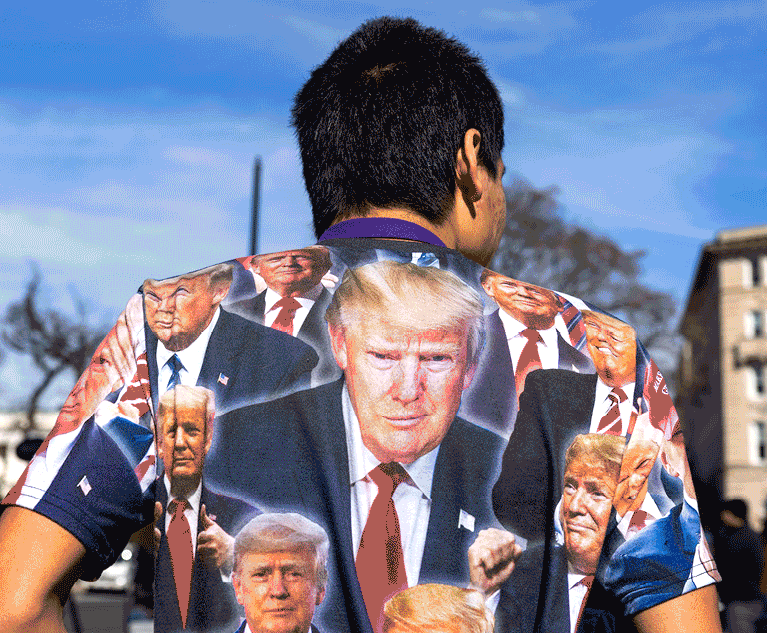 Credit: fizkes/Adobe Stock
Credit: fizkes/Adobe Stock New York Will Enhance Access to the Profession by Easing Limits on Remote Learning
The New York Court of Appeals must act now to ease New York's restrictive rules on distance learning tied to bar eligibility to ensure the rules keep pace with a changing world.
May 04, 2022 at 10:00 AM
7 minute read
The pandemic experience has taught us that law schools can be highly successful in using remote instruction to add flexibility to evening and part-time law programs, providing working students from a range of backgrounds with enhanced educational access and other benefits, while maintaining high educational standards and quality. However, as pandemic conditions abate, emergency waivers suspending restrictions on distance education for New York's law schools will expire when the school year ends, threatening to end much of the flexibility and innovation realized over the past two years. The New York Court of Appeals must act now to ease New York's restrictive rules on distance learning tied to bar eligibility to ensure the rules keep pace with a changing world.
The requirements for eligibility for bar admission regulate the legal education of aspiring New York lawyers. For remote or "distance" learning, the court's rules have until recently tracked the American Bar Association's law school accreditation requirements. Distance learning was capped at 15 credits out of the required minimum of 83 credits. In 2020, the ABA revised its accreditation standards to permit greater use of distance learning while still requiring the core of legal education to be provided in person: Up to one-third of the credits required for a J.D. degree may now be offered through distance education, provided there is regular and substantive interaction between faculty and students. In January 2022, the ABA Council on Legal Education endorsed further amendments to permit up to 10 of these distance education credits to be earned in a student's first year. These revisions will go before the ABA House of Delegates in August. New York's rules, however, have remained unchanged, creating a substantial gap between ABA accreditation standards and the requirements of the New York bar—the ABA permits almost twice as much distance learning as the Court of Appeals.
This content has been archived. It is available through our partners, LexisNexis® and Bloomberg Law.
To view this content, please continue to their sites.
Not a Lexis Subscriber?
Subscribe Now
Not a Bloomberg Law Subscriber?
Subscribe Now
NOT FOR REPRINT
© 2025 ALM Global, LLC, All Rights Reserved. Request academic re-use from www.copyright.com. All other uses, submit a request to [email protected]. For more information visit Asset & Logo Licensing.
You Might Like
View All
The Power of Student Prior Knowledge in Legal Education

Benjamin West and John Singleton Copley: American Painters in London
8 minute readLaw Firms Mentioned
Trending Stories
Who Got The Work
J. Brugh Lower of Gibbons has entered an appearance for industrial equipment supplier Devco Corporation in a pending trademark infringement lawsuit. The suit, accusing the defendant of selling knock-off Graco products, was filed Dec. 18 in New Jersey District Court by Rivkin Radler on behalf of Graco Inc. and Graco Minnesota. The case, assigned to U.S. District Judge Zahid N. Quraishi, is 3:24-cv-11294, Graco Inc. et al v. Devco Corporation.
Who Got The Work
Rebecca Maller-Stein and Kent A. Yalowitz of Arnold & Porter Kaye Scholer have entered their appearances for Hanaco Venture Capital and its executives, Lior Prosor and David Frankel, in a pending securities lawsuit. The action, filed on Dec. 24 in New York Southern District Court by Zell, Aron & Co. on behalf of Goldeneye Advisors, accuses the defendants of negligently and fraudulently managing the plaintiff's $1 million investment. The case, assigned to U.S. District Judge Vernon S. Broderick, is 1:24-cv-09918, Goldeneye Advisors, LLC v. Hanaco Venture Capital, Ltd. et al.
Who Got The Work
Attorneys from A&O Shearman has stepped in as defense counsel for Toronto-Dominion Bank and other defendants in a pending securities class action. The suit, filed Dec. 11 in New York Southern District Court by Bleichmar Fonti & Auld, accuses the defendants of concealing the bank's 'pervasive' deficiencies in regards to its compliance with the Bank Secrecy Act and the quality of its anti-money laundering controls. The case, assigned to U.S. District Judge Arun Subramanian, is 1:24-cv-09445, Gonzalez v. The Toronto-Dominion Bank et al.
Who Got The Work
Crown Castle International, a Pennsylvania company providing shared communications infrastructure, has turned to Luke D. Wolf of Gordon Rees Scully Mansukhani to fend off a pending breach-of-contract lawsuit. The court action, filed Nov. 25 in Michigan Eastern District Court by Hooper Hathaway PC on behalf of The Town Residences LLC, accuses Crown Castle of failing to transfer approximately $30,000 in utility payments from T-Mobile in breach of a roof-top lease and assignment agreement. The case, assigned to U.S. District Judge Susan K. Declercq, is 2:24-cv-13131, The Town Residences LLC v. T-Mobile US, Inc. et al.
Who Got The Work
Wilfred P. Coronato and Daniel M. Schwartz of McCarter & English have stepped in as defense counsel to Electrolux Home Products Inc. in a pending product liability lawsuit. The court action, filed Nov. 26 in New York Eastern District Court by Poulos Lopiccolo PC and Nagel Rice LLP on behalf of David Stern, alleges that the defendant's refrigerators’ drawers and shelving repeatedly break and fall apart within months after purchase. The case, assigned to U.S. District Judge Joan M. Azrack, is 2:24-cv-08204, Stern v. Electrolux Home Products, Inc.
Featured Firms
Law Offices of Gary Martin Hays & Associates, P.C.
(470) 294-1674
Law Offices of Mark E. Salomone
(857) 444-6468
Smith & Hassler
(713) 739-1250








